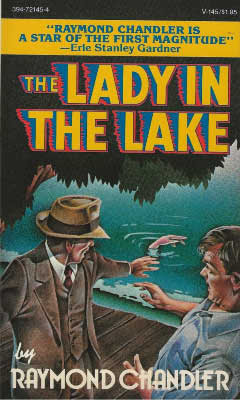Lady in the Lake
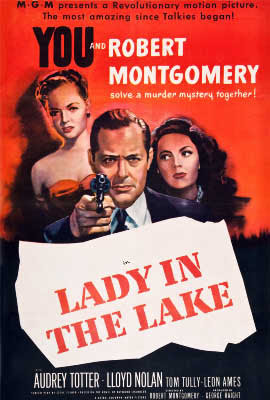
Director: Robert Montgomery
Year: 1946
Rating: 4.0
It felt
like I ate a bucket of sand while watching this. Dry sand. Everything about
it is wrong. Admittedly, I just re-read the book and was comparing it to
that as we went along. And the changes just make no sense. Maybe it would
be better if I hadn't, but I doubt it. Raymond Chandler spent three years
writing this novel, going back and forth between this and Farewell, My Lovely.
In the end, like with most of his novels, he based it on one of his short
stories - in this case three of them that he fused together. It isn't his
best work, but it is a fine novel with a surprise waiting at the end like
finding your wife in bed with the milkman. It isn't really his plots
that matter - often overly complicated - but his elegant writing, his descriptive
eye, his tough guy dialogue, his love for the sublime metaphor or clever
simile. And for Marlowe. One of the great detectives in literature.
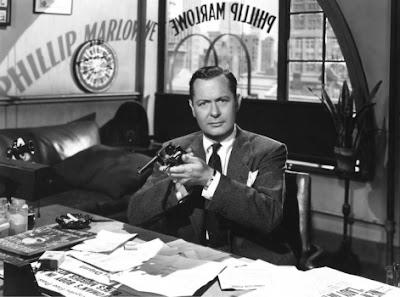
Chandler as usual was drinking too much
and on the edge of being broke. His books never actually sold a lot. In the
3-4,000 copy range. It wasn't until his publisher decided to release his
earlier books in paperback format that he sold like gangbusters. Back then
it wasn't a common practice to re-issue books in paperback. He sold the movie
rights to this book for $30,000 and wrote a film script for it. But it was
tossed out and another author was brought on. Though he kept the high-level
plot, he makes a mess out of it as if he took Chandler's book and threw the
pages up in the air and used that as his basis. Chandler hated the final
product. For good reason. The author should have been charged for negligent
manslaughter.
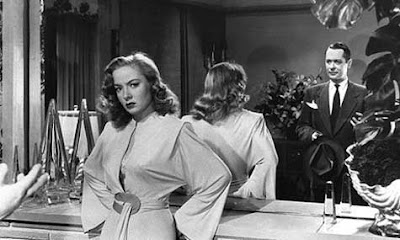
Robert Montgomery asked MGM to direct this
film. His debut. The books with Marlowe are written in first person. And
Montgomery decides to take that concept and wrap his film around it. Most
of it is shot POV with the camera lens standing in for Marlowe. It sees through
his eyes. MGM wasn't pleased. What? You never see the star? Well, a few times
we see his reflection in the mirror and in a really awkward manner, a few
times Marlowe speaks directly to the audience to explain things that have
happened off screen. Important things. In the book, he is hired by a husband
to find his missing wife and Marlowe goes up to their cabin in the woods.
While he is there, they discover the wife of the groundskeeper drowned in
the water. And he investigates that as well because he wonders if they are
connected. All that is explained by Montgomery/Marlowe to us in his monologue.
To save time? To save money? It is a vital part of the story that leads to
everything else. If they wanted to save time, they should have cut out the
romance that never happens in the book. It alone almost kills this film.
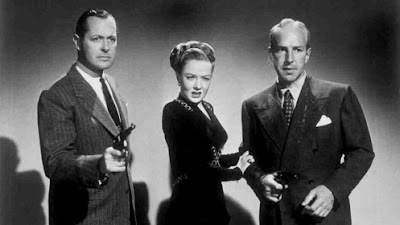
But it isn't the POV that ruins this film.
You can give Montgomery credit for trying something new along with the Fourth
Wall aspects. It doesn't really work but he tried something different. Bogart
used it later in the year in Dark Passage for half the film - though it made
sense there as he changes his looks halfway through. The only time I appreciated
the POV was when a seductive secretary walks into the office and then walks
back with everything on overload and the camera never leaves her for a second.
The real weakness of the film though is Montgomery as Marlowe.
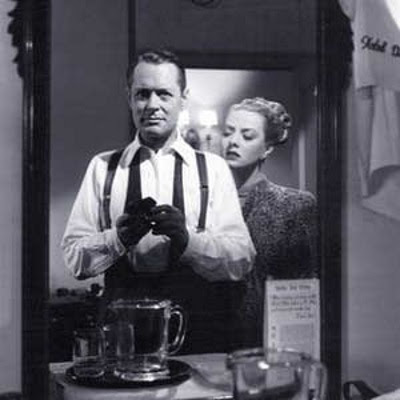
He gets Marlowe all wrong. Marlowe is a
knight errant always following his code of chivalry and justice. From the
books we never learn much about him - in the first-person narrative he never
talks about himself or his background. We know him from his actions and he
is admirable. He searches for justice for $10 a day plus expenses. He gets
chances to back out or take money and never does. This Marlowe is basically
a jerk - unlikable - full of snide, sarcastic and snappish remarks. Don Rickles
as Marlowe. It is like Detective 101. Not everything they say has be a jibe,
an insult, sarcastic.
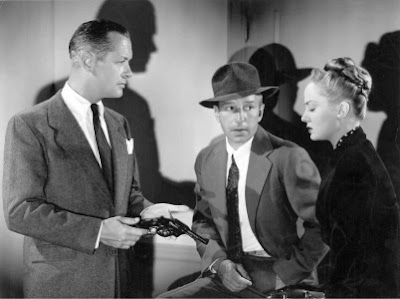
Which makes the upcoming romance ridiculous
- as phony as a puppy passing itself off as a rooster. The scene of her telling
him how much she needs him is like fingernails across the blackboard.
A hard-bitten woman who turns into mush because of his acidic charm. You
don't buy it for a second. So many things are off about this that I could
write a book - why do they move it to Christmas, why does Lavery (the lover
of the missing wife) sound like he escaped from Gone with the Wind, why does
Marlowe get knocked out twice and doused with booze, why does the Captain
of police get two phone calls from his family asking him to come home from
work that we have to listen to, why doesn't Marlowe carry a gun at crucial
times, why has he become a writer of short fiction. Why didn't they use Chandler's
script.
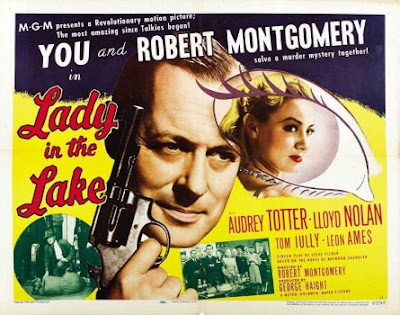
There is a solid cast which helps you get
through this - Lloyd Nolan, Audrey Totter, Tom Tully as the Captain, Leon
Ames as the husband, Jayne Meadows as the landlady and Lila Leeds as the
secretary. The film didn't do well and MGM sent Montgomery packing. He bounced
back though with his next film - Ride the Pink Horse which he directed and
has a great reputation.








